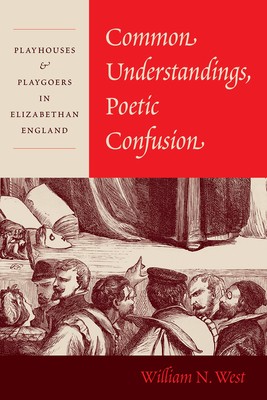
- We will send in 10–14 business days.
- Author: William N West
- Publisher: University of Chicago Press
- ISBN-10: 022680903X
- ISBN-13: 9780226809038
- Format: 15.2 x 22.9 x 1.8 cm, minkšti viršeliai
- Language: English
- SAVE -10% with code: EXTRA
Reviews
Description
A new account of playgoing in Elizabethan England, in which audiences participated as much as performers.What if going to a play in Elizabethan England was more like attending a football match than a Broadway show--or playing in one? In Common Understandings, Poetic Confusion, William N. West proposes a new account of the kind of participatory entertainment expected by the actors and the audience during the careers of Shakespeare and his contemporaries. West finds surprising descriptions of these theatrical experiences in the figurative language of early modern players and playgoers--including understanding, confusion, occupation, eating, and fighting. Such words and ways of speaking are still in use today, but their earlier meanings, like that of theater itself, are subtly, importantly different from our own. Playing was not confined to the actors on the stage but filled the playhouse, embracing audiences and performers in collaborative experiences that did not belong to any one alone but to the assembled, various crowd. What emerged in playing was a kind of thinking and feeling distributed across persons and times that were otherwise distinct. Thrown apples, smashed bottles of beer, and lumbering bears--these and more gave verbal shape to the physical interactions between players and playgoers, creating circuits of exchange, production, and consumption.
EXTRA 10 % discount with code: EXTRA
The promotion ends in 21d.17:35:46
The discount code is valid when purchasing from 10 €. Discounts do not stack.
- Author: William N West
- Publisher: University of Chicago Press
- ISBN-10: 022680903X
- ISBN-13: 9780226809038
- Format: 15.2 x 22.9 x 1.8 cm, minkšti viršeliai
- Language: English English
What if going to a play in Elizabethan England was more like attending a football match than a Broadway show--or playing in one? In Common Understandings, Poetic Confusion, William N. West proposes a new account of the kind of participatory entertainment expected by the actors and the audience during the careers of Shakespeare and his contemporaries. West finds surprising descriptions of these theatrical experiences in the figurative language of early modern players and playgoers--including understanding, confusion, occupation, eating, and fighting. Such words and ways of speaking are still in use today, but their earlier meanings, like that of theater itself, are subtly, importantly different from our own. Playing was not confined to the actors on the stage but filled the playhouse, embracing audiences and performers in collaborative experiences that did not belong to any one alone but to the assembled, various crowd. What emerged in playing was a kind of thinking and feeling distributed across persons and times that were otherwise distinct. Thrown apples, smashed bottles of beer, and lumbering bears--these and more gave verbal shape to the physical interactions between players and playgoers, creating circuits of exchange, production, and consumption.


Reviews